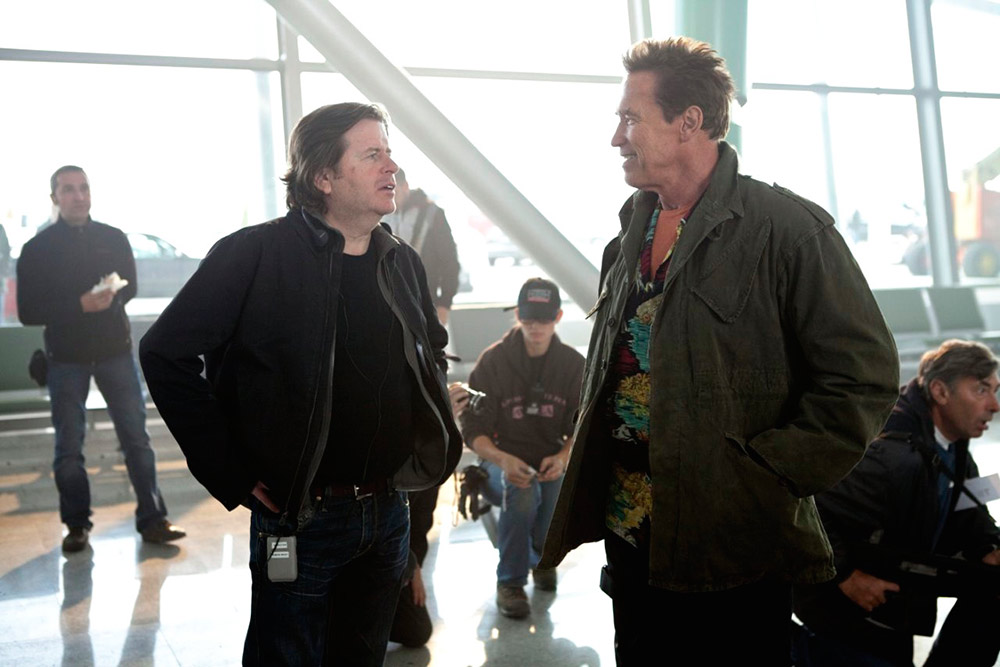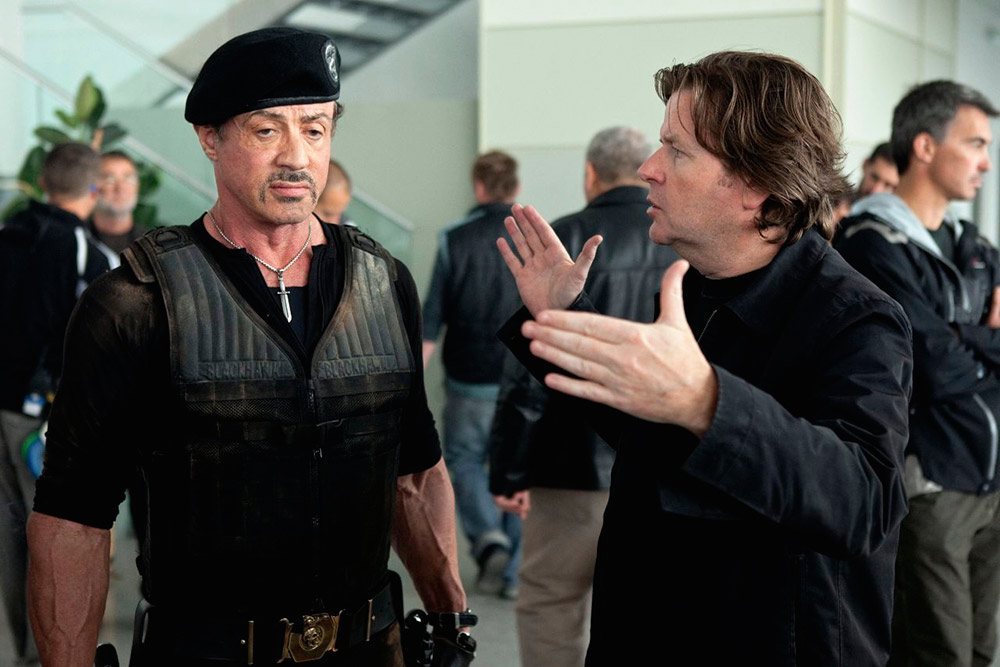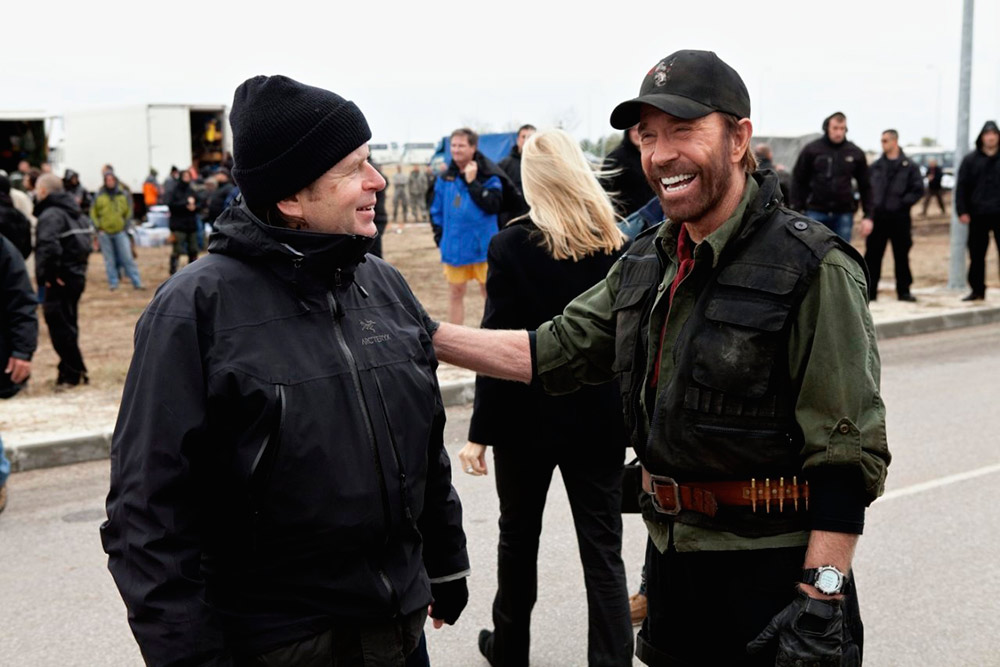Become a Blockbusting Film Producer with Simon West
Simon West is the celebrated British director of big budget action movies such a Con Air, The Incredibles 2, The General's Daughter, Tomb Raider and The Mechanic amongst others. He has worked with a stellar cast of Hollywood actors, such as Bruce Willis, Angelina Jolie, Sylvestor Stallone, Arnold Schwarzenegger, Nicolas Cage, John Malkovich, John Cusack, Jason Statham and many more.
His current project is somewhat different and aims to succeed in funding small to mid level budget films outside the studio system through equity based crowd funding. Quite simply you can buy a share in Simon West's next movie and become a producer starting with a £1000 investment. Many of his films have made a very tidy profit indeed so you could potentially make a very good rate of return. Some films have already been produced through crowd funded donations but with this you actually buy shares in the company and get a return if the film makes a profit. If the investment is large enough you can even get a possible walk on part or attend the premiere. All the investors get to share in the progress of the film and its production through a special website.
Simon's track record makes this a very interesting and possibly lucrative investment. If you are a film buff it's worth it just for the experience in being involved in such a great project.
International eXcellence Magazine caught up with this legendary director for an in depth interview. This is a transcript of our conversation.
IX Magazine - : You originally grew up in Hertfordshire, where are you based now?
Simon West - : Now I'm in Oxfordshire. I actually moved. When I was 15, I moved to Oxfordshire, and I've been here ever since then, back and forth. I went to the States to seek my fortune and start my career in the 1990s, basically, and spent a long time there. But I've always come back here on and off, to visit. Then I decided I really want to move back here permanently now.
IX Magazine - : Do you still have a base in the States?
Simon West - : No, I mean I just go back and forth, so based out of the UK.
IX Magazine - : How did you start in the film business?
Simon West - : I was like a film brat. I had an 8mm camera and made my own little films. I managed to talk my way into the BBC Film Training Program when I was 18. So went straight from school to the BBC. They had an amazing film training school at that point. I started in and learned all about editing. I really went round those departments. They moved me from drama to documentaries to concepts. I started getting itchy feet after four years and started making my own little movies. Often with the BBC equipment, I have to say.
I got a grant to make a music documentary which led me into commercials. I looked at how you get into movies? I looked at people like Richard Scott and Tony Scott and other British directors. They all went through commercials. So I thought, well okay, that's how I'll do it then. So I started making commercials. The company I worked for had an office in L.A and they said, "Do you want to try out in L.A.?" I said, "That's even closer to Hollywood, where I actually wanted to end up." The film business in England at that time was dead. There was no work whatsoever. It was either commercials or nothing. So I thought at least I'll have a go out there and off I went. Luckily I got to do the holy grail of American commercials, the Super Bowl spots, which are the mega commercials that cost a fortune. That got the attention of Jerry Bruckheimer, who offered me my first film, which was Con Air.
IX Magazine - : Yes, that was quite a jump, to go from the commercials straight into Con Air!
Simon West - : It was. I mean technically, commercials are very good training. By that time, I'd shot in half the countries of the world. In airplanes, submarines and underwater. I'd done special effects in all conditions and recieved a huge amount of training. What it doesn't prepare you for is the size of the feature film. You know, doing commercials you've done five-six day shoots at the most. Then you have a nice break. Suddenly to be on a 100-day shoot, with a lot of Hollywood stars, is a shock to the system. A lot of it is stamina. To work 15 hours a day for 100 days straight was quite physically challenging. Not to mention the mental thing of being with a Hollywood studio on one side and all the personalities of the stars on the other. I didn't really know what I was letting myself in for. Luckily I was naïve going into it. I thought "oh, this is doable, this is handleable". You know, by the time you're in it, you can't really get out of it. I learned on my feet, trial by fire, so to speak.
IX Magazine - : Sounds like a good lesson in stress management!
Simon West - : Yes, well I don't know if I managed it. But I certainly had the stress, yeah.
IX Magazine - : Now you've got this new crowd funded project, a film called Salty. What attracted you to this script?
Simon West - : Financing in a completely independent way. You know, with big studio movies you get a lot of money, but you're also a part of that big machine. Then even with independent films, you're going around to big institutions and hedge funds of banks. Basically asking for a big loan to make a film, even if it's independently. While I was in that process, of doing the traditional fundraising for it, I was approached by an investor. He said, "Have you thought about crowdfunding?" I didn't really know much about it. They said, "Well you know, they do it for start-up companies, or investors that can't get their projects launched and need money." This investor said "Have you ever thought of doing it for a movie?" They explained it all to me, and I thought, "Actually, that could work." It's different in the UK in that you're not really asking for donations. People invest in the film or become partners and shareholders in it. It's not so much a donation as a partnership. They can actually participate in the revenue of the film. Because it's a large group of people who fund. You're not doing it with a large institution that's going to have a creative influence on everything you do. It's a fun way for people to contribute. Also, I feel like I'm going to have all these people rooting for the success of the film. There's a lot of positive energy when someone invests in your film, it creates a community.
IX Magazine - : Why this film in particular for crowdfunding, was it just the timing?
Simon West - : No, I actually chose it because I knew I could do it on a very modest budget. It is a new and an experimental way of doing things. It would be unrealistic to put together a film that was $100 million, and then go and say, okay I'm going to hope that I get enough people to invest $100 million. It has a very modest budget, so it's very achievable. I think the idea is that you do this a lot. I want it to be successful so that I can do this again and other people can do it. I wanted to make something, a target that was attainable. The film had to suit that target and a budget level that was not unreasonable to expect people to raise. Even as a $10 million budget, you don't actually have to raise the whole £10 million. I actually only need £1.8 million to trigger the rest of it. So you can do the rest through foreign sales, you sell to countries around the world for the equity part. To trigger a film of that size, you only need £1.8 million. Which is not an outrageous amount to think that you can raise. There's much more chance of it being a success financially for people, because it's not a huge target to hit. The probability of success is much higher if the budget is lower.
IX Magazine - : Do you have pre-sales in place already or as you said, will they be triggered by reaching that £1.8?
Simon West - : No, they'll be triggered by that. Also, the traditional way of foreign sales. Obviously they're interested in who the actors might be in it, the lead actors. That's the process. The first money is the equity money. Once we have that, then we would go to cast. Once the names start attaching, that's when the pre-sales become attractive to the foreign territories. Then the names jump on as well.
IX Magazine - : Do you have any tentative names on board?
Simon West - : Well you know, I've done my wishlist and everything. With all these things, the names I want to go with, my films do tend to go for big names. I like an ensemble cast of recognizable, accomplished actors. They really want to know that the project's real. It's not even about the money or how much they're going to get. If they like the material, you can get really big names. If the material is liked, but also if it's real. Once you've raised the money, then the project becomes real. Then I can talk seriously to the actors I want. I really want, as with my other films, high level actors. Whether it's like what I did in Con Air, which were serious independent Indie actors who I suddenly put in an action movie. Or using people that don't normally do action movies, such as comedy actors. Approaching some very serious actors. The Oscar type of film, and do a comedy action film with them is very interesting to me. To switch them around like that. Obviously that would be in the next stage of the process.
IX Magazine - : How many films have you made that have made money? And how many lost money?
Simon West - : None have lost money. Most of them have done well theatrically, especially in the States, or internationally. I've never actually lost money, I think one film was a video-on-demand release. Even that actually made money as the budget was modest. I have to say that I've never ever made a film that lost money.
IX Magazine - : What was the budget on that one?
Simon West - : I think it was £15 million. By the time it was sold to China and Russia and video-on-demand, it easily surpassed that. It never actually lost money. I think one of the financial people have done my average or something, and I'd have to check it. But I think the average box office is like $68 million on films I've done. But obviously some of them have made much more. Expendables did $300 million, Con Air $200 million, and General's Daughter did over $100 million in America. Then another $100 or so internationally. I think it's about the investment. Even the film I did for Screen Gems, which was When a Stranger Calls, a scary film, that was a $15 million budget. But that did three times its budget in the box office. That's the thing about these mega films, where they cost $200-$300 million dollars. By the time they're marketed and everything, they have to make $1 billion to break even. In some ways, it's less stressful and more satisfying to have the lower budget, because you can reward the people that invested in it. Your investors and your financiers, more easily. It's more easy to double or triple their money for them. Really all it does is enable you to make another film, which is really all filmmakers want to do. Which is to be able to make another one after the one they've just done.
IX Magazine - : How would the potential profit, if it worked really well, be calculated and shared out?
Simon West - : That's a more complicated financial area than my expertise. I'm very much on the creative side of it, and saying I'll make successful films. The actual way that money is paid out ... Because this is an HMRC BIS film scheme that is all backed by the government. If people go and actually do invest in this, it's all explained. You know, the risks and the upside, and the benefits and things like that. It's all explained on the website before you ever invest. Obviously everyone would have to do due diligence and read all the information and get it checked by their financial advisors. It's a way to participate in a film partnership, rather than a get-rich-quick thing or a tax avoidance thing.
IX Magazine - : It's based on shares, rather than a point system that some of the studio systems use?
Simon West - : Absolutely, yes. It's more like being a producer on the film, than some points system.This is much more like investing in a pharmaceutical company, or an airplane company. You set up a company and the film is that company.
IX Magazine - : So when are you hoping to start filming?
Simon West - : I'm hoping in 2015. You know, there's the process of raising the money. Then there's the foreign sales and everything. These things all take much longer than I'd always wanted. It will probably be in the early part of 2015. Early to mid part of 2015, depending on when all these things fall into place.
IX Magazine - : What would be as rough time frame for investors to see a return on their money?
Simon West - : It's all explained on the website and the prospectus for the company. I urge anyone, before investing in it, to read that and get it all checked. Every possible question about it is explained in detail. What I like about it is that I get to make the film I want because I don't have to answer to a studio or a large financial institution. It's really that creatively I can make the best film possible. Due to the films I've made people will hopefully trust me that it will be a commercial film that a lot of people want to go and see. I'm not making a strange art film that nobody is going to want to watch or will never make any money. The intention is that it is a broad-appeal, commercial film.
IX Magazine - : Are you hoping to start a trend for film financing on smaller budgets for more personal films?
Simon West - : I think so, yes, because it's a really interesting way to do it. Instead of these these things depending on one person's opinion and whether they will invest or not. Or one small group or committee of people if they would. You can put it out to the public. If the public like the idea of it. They like the idea of you making it, they like the idea of the story and the type of film. Then you've already got a wider mandate, because already a larger group of people have said, we like the idea of that film. So it's much more likely to appeal to a wider audience. This system t tends to favour not huge budget films but smaller budget films. It can be targeted at special interest subject matters. Where that group of people that are fascinated by that world, or that particular style, can vote with their feet. Say we want a film about our world. Whether what you're interested in is steam engines or tattooing or whatever. It can target an audience specifically, because again, they'll vote with their investment. Anyone who feels "I'll go and see that film, and I'll prove it by investing in it."
IX Magazine - : There should be a gap in the market for that!
Simon West - : Yes, I think so. These studios and even the big independent films were guessing what people want. So they're going to make the film, and then if the ones that are successful or do well, then they try and make them again. Because that's the information they're working on, as some kind of research. They're selling the films after they've made them. This is an interesting dynamic. We're selling the film before it's made to see if anybody wants to buy that film. Again, they can vote with their checkbooks, really. If they don't want to see a film like that, or they don't want to see a film made by those filmmakers, then they won't do it. You really get your answer before you've spent a penny or made the film.
IX Magazine - : Will that cause any problems as an independent when it comes to distribution?
Simon West - : I know the intention is that, like all independent films, you want and try to get the distributor in as soon as possible. It's one of those things that if the budget is low enough, and the interest is high enough, they can quickly get on board. Also depending who is in it. Actors and who the director is and their track record. They'll just do the usual quick calculation, like they do with all independent films, which decides whether they want to distribute it. Even distribution is changing now and less traditional. Now it's Netflix and Amazon and Xbox, and all those other ways of distributing film. It's not necessarily theatrical. Because to release a film theatrically, it's a huge amount of money. Again, if it's a niche film or a smaller film you can sell direct to your target audience in other ways. I think it's another evolution, the way distribution is changing now. I think the financing is also going to be much more public driven and specific audience driven.
IX Magazine - : So is the marketing budget part of the investment? Or would that be part of the distributor's responsibility?
Simon West - : As far as I know, that's part of the distributor's expenditure. The same way it always is with independent films.
IX Magazine - : What one thing could you tell our audience why they should invest in this project?
Simon West - : Well I think they should only invest in it if they like the idea of the genre and the world, and they think that they like my films. Or they think ... Even if they're only doing it for financial reasons, that there's a good chance that it will make money because of my reputation. As far as I know, there's also tax benefits for doing it. You don't give away every penny you invest, as it were. The government does reward you for investing in a venture like this. I would definitely say to read all the information and be comfortable with it. If you're comfortable with it and you like the idea of the world, and it's a pure fun investment as well. You can track the film and track who is going to be in it. When it's released you will feel be part of something creative and amazing. If all those things have any interest, then invest.
IX Magazine - : Why Syndicate Room in particular?
Simon West - : They approached me with the idea, and then I checked into them. I met the team and it was a very pleasant team. I looked at their other projects that they've launched. None of which of course are film, they're all people who have invented an airplane. One was a pharmaceutical company and many diverse investments. I just liked the idea. We liked the way that they explained how it worked, and how much detail they went into. How many ideas they had for how to expand this afterwards, when this is a success. Or how to do it again and again. I found it very impressive and so I said okay, I'll take a go at it. Do this revolutionary new thing.
IX Magazine - : You've worked with pretty much every box office star in the world. What was your favourite movie to work on, and why?
Simon West - : That's interesting. Con Air, I suppose, ultimately. At the time I wasn't so sure, but I've got a lot of nostalgia for it. That was a lot of fun. The other one was The General's Daughter, I liked that as well, because it turned out the most how I wanted it to. Tomb Raider I liked differently. Because it was a bit more like a James Bondy-kind of film. Also it was shot in England. Whereas all my other films have been shot all over the world. That's the one film I've actually got to shoot at home. Even though part of it was in Cambodia and Iceland, most of it was at good old Pinewood Studios. That was fun because of that. Because I could actually be making a film in my home country.
IX Magazine - : You've been working constantly for the last 20 years. What do you do to relax and to maintain a good quality of life?
Simon West - : I'm still trying to work that out. I don't know, really. It is an all encompassing life. I have four children, so, between films and four children, there isn't really a lot of time left for relaxing, by the time I've paid attention to both of those things, unfortunately. That's part of the reason I moved back to England. Working in Hollywood, it's even more intense than just being in the film business, being at the heart of it. It's very difficult to escape from it. Living back in England, it's a much more variable world. I meet people that do all sorts of different jobs and not just in the film business. I suppose what I do to relax is to escape from the film business. Anything that's not to do with the film business. Even when it's mowing the lawn.
If you want to see more information with the chance to become a film producer read more here:
https://www.syndicateroom.com/salty
Simon West explains the project in this video:
http://internationalexcellence.co.uk/content/invest-new-blockbuster-film...














